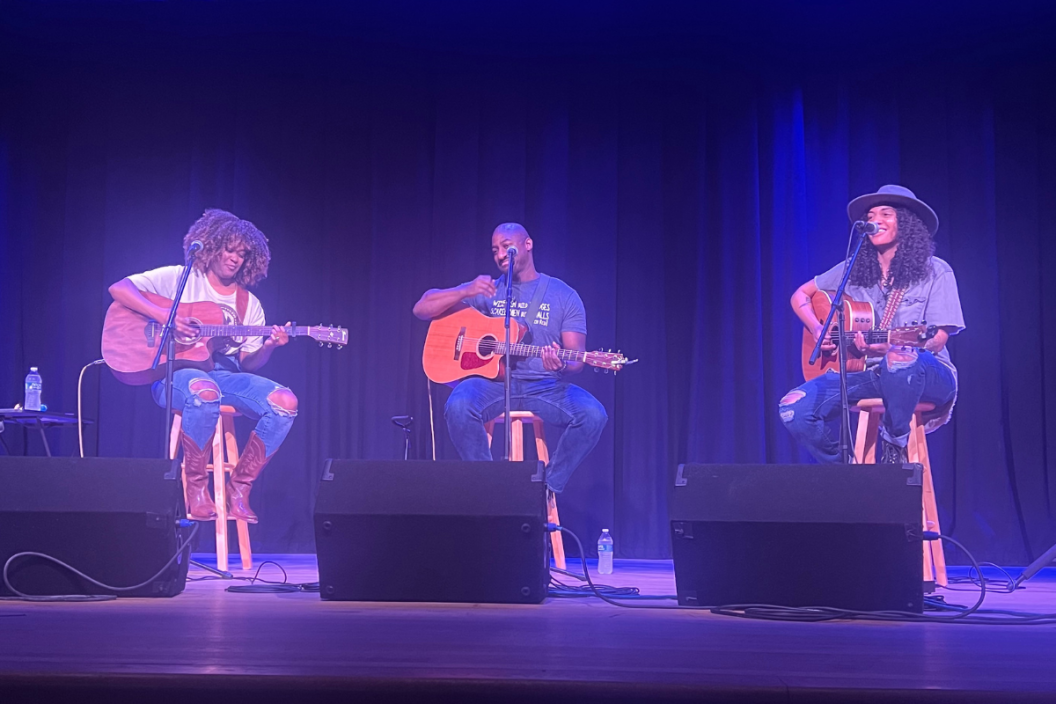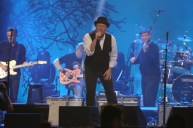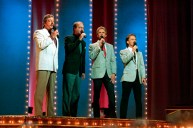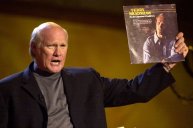Black Opry brought soul and tremendous heart to Lewisburg, West Virginia on Feb. 23. Taking the Carnegie Hall stage, a trio of performers — Roberta Lea, Justin Reid, and Whitney Mongé — lassoed the community with a mix of intimate lyrics and propulsive musical gumption.
In a songwriter's round setup, each performer delighted with the kind of storytelling power you're not likely to hear on the radio these days. While Lea has been performing as part of Black Opry since its inception two years ago, both Reid and Mongé made impressive debuts with a catalog of should-be smash hits. Each wielded their own particular brand of style; Reid bills his work as "soul-folk," whereas Lea's is best described as "country-neo-pop," with a delicious folky flair. Mongé bends genres, from blues to rock, like fragments of light. And they all more than hold their own when given the microphone.
For the opening round, Lea debuted a brand new song, titled "Too Much of a Woman," slated for release in March. Before launching into the acidic, thumb-biter, she made it clear it was "not about my husband," she quipped. The song featured one wonderfully audacious hook — "If I'm too much of a woman, you're too little of a man," she sang, eliciting chuckles and cheers from the crowd. And that was only the beginning of an evening packed with similar standout musical moments.
Lea then pumped the brakes for a sentimental song dedicated to her father, who suffered a stroke in 2020. "Uniform," found on her 2021 EP, Just a Taste, stuns with its acoustic roots stretching beyond the confines of folk music. "From Japan to Desert Storm, he earned his stripes, a hero born / There's nothing like a man in uniform," she beamed over plucky guitar chords.
As her father served in the military, and her husband in the Navy, it was both a delicate and sweet performance and allowed Lea to demonstrate her knack for melody writing. While her father lay in his hospital bed, Lea and her family waited with bated breath back at home; COVD-19 restrictions kept them apart. It was a photograph from fifth grade, her in school clothes and her father in a army uniform, that struck her heart. She tucked away the song idea until much later when it finally birthed into the world.
Before performing another original, Lea stripped The Temptations' "Papa was a Rolling Stone" (originally recorded by Undisputed Truth) into an airy folk tune. She was at a barbeque when the song blasted from the radio. It hit her in a way she never experienced before, and she knew it was worthy of fitting into her live repertoire. Her rendition was electric and smooth, a demonstration of her talent to upend expectation.
Then, there came three more originals, "Dinner, Sunset, and Nina Simone," "He Can't Dance," and "Ghetto Country Streets." With the latter, she regaled a tale about seeing her kids playing on the same playground she did as a child. "Back in my day, this is how we did things," she laughed. Lea, now 37, certainly knows a thing or two from her time on this earth. "All we needed was some trash bags and soap and we had the best slip 'n slide in town," she joked.
With Reid's set, the Greensboro, N.C.-based singer-songwriter first poured his thick, caramel vocals over a yet- untitled song about heartbreak written from the "perspective of the ladies," he said. His voice smoldered, as though wrought from iron. And the crowd ate up every single minute.
It also helped that Reid was so charismatic on stage, often joking about how he only writes breakup songs and rarely anything else. But his set also included a song about his relationship with God, pulling from his upbringing with a pastor for a father, but through the lens of heartache.
One of the night's best songs came with Reid's "Loose Change," which he prefaced with a joke about needing more money to buy things and make music. It might not be about a breakup or changing the world, but sometimes you need groovy little numbers to bring some levity to the performance.
His "The Hurt and the Change" proved to be another important moment, a song stitched together from two previous songs that transformed into the most soulful of his songbook. "Wise men build bridges / Scared men build walls," he sang. He also happened to be wearing one of his merch shirts with the lyrics emblazoned on the front. Of course, he was self-aware enough to point it out.
Turning attention back to heartache, he then whipped out "Sick and Tired," an ode to soul-crushing relationships. And without a warning's notice, he abruptly segued into a fiery version of Carrie Underwood's 2006 hit "Before He Cheats," his eyes beaming with pride.
Reid has yet to release a debut album, but it's evident he'll make quite a statement when he finally does.
Mongé possesses a voice not of this world. Whether she snarled about forlorn love ("Good Things") or ripped into the blues-crusher "Day n Nite" or wondered "What Would Love Do Now," she made sure to showcase spectacular guitar work, often causing the audience to erupt with thunderous applause and whoops. "The Family" saw a similar reaction. As she nears 40, she began contemplating the passage of time and how often you "lose touch with people," she reflected. When she was younger she "didn't quite get it," but such is the way of human existence. "The family's gone cold," she sang with a particular heaviness. Her voice might be sharp, but her pen is even sharper, turning over lyrical stones you may not even be looking for.
After being burned out on music-making even before the pandemic, she lost touch with herself and her work. She was "trying to remember why I do this," she said about her next song. In the moment, the song was titled "Moving Along" (although that's not set in stone) and it became one of the night's finest. To get a taste of Mongé's live performance, flip through her 2021 live studio set, a collaboration with the Seattle Symphony. You won't be disappointed.
The night also included several other covers, including Mongé performing Led Zeppelin's 1971 song "Going to California." The very-much earned encore featured the group taking on George Jones' "Tennessee Whiskey" (famously recorded by Chris Stapleton), and it was nothing short of marvelous. "You're as sweet as strawberry wine / You're as warm as a glass of brandy / And honey, I stay stoned on your love all the time," sang Reid, taking the lead. Mongé and Lea wrapped their voices around his to create a truly special ending.
It's no secret Black Opry, founded by Holly G. and co-directed with Tanner D., is doing important work. They give much needed space to Black singers, songwriters, and musicians that may not otherwise have the chance to perform on stage. More than anything, it is crystal clear that the talent waiting in the wings for their big break has what it takes (and then some) to compete with today's biggest heavy hitters.




